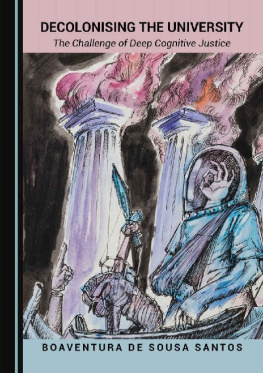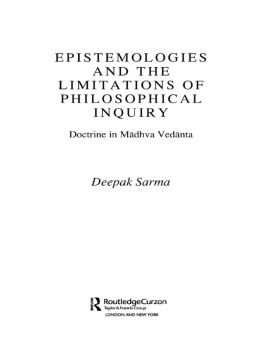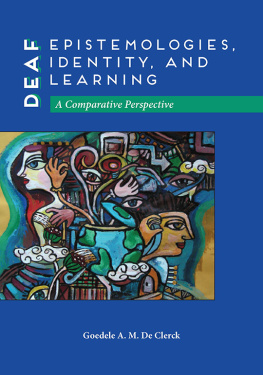Santos - Epistemologies of the South
Here you can read online Santos - Epistemologies of the South full text of the book (entire story) in english for free. Download pdf and epub, get meaning, cover and reviews about this ebook. year: 2015, publisher: Taylor and Francis, genre: Politics. Description of the work, (preface) as well as reviews are available. Best literature library LitArk.com created for fans of good reading and offers a wide selection of genres:
Romance novel
Science fiction
Adventure
Detective
Science
History
Home and family
Prose
Art
Politics
Computer
Non-fiction
Religion
Business
Children
Humor
Choose a favorite category and find really read worthwhile books. Enjoy immersion in the world of imagination, feel the emotions of the characters or learn something new for yourself, make an fascinating discovery.

- Book:Epistemologies of the South
- Author:
- Publisher:Taylor and Francis
- Genre:
- Year:2015
- Rating:5 / 5
- Favourites:Add to favourites
- Your mark:
- 100
- 1
- 2
- 3
- 4
- 5
Epistemologies of the South: summary, description and annotation
We offer to read an annotation, description, summary or preface (depends on what the author of the book "Epistemologies of the South" wrote himself). If you haven't found the necessary information about the book — write in the comments, we will try to find it.
Santos: author's other books
Who wrote Epistemologies of the South? Find out the surname, the name of the author of the book and a list of all author's works by series.
Epistemologies of the South — read online for free the complete book (whole text) full work
Below is the text of the book, divided by pages. System saving the place of the last page read, allows you to conveniently read the book "Epistemologies of the South" online for free, without having to search again every time where you left off. Put a bookmark, and you can go to the page where you finished reading at any time.
Font size:
Interval:
Bookmark:

Epistemologies of the South
Epistemologies
of the South
Justice against Epistemicide

BOAVENTURA DE SOUSA SANTOS

First published 2014 by Paradigm Publishers
Published 2016 by Routledge
2 Park Square, Milton Park, Abingdon, Oxon OX14 4RN
711 Third Avenue, New York, NY 10017, USA
Routledge is an imprint of the Taylor & Francis Group, an informa business
Copyright 2014, Taylor & Francis.
All rights reserved. No part of this book may be reprinted or reproduced or utilised in any form or by any electronic, mechanical, or other means, now known or hereafter invented, including photocopying and recording, or in any information storage or retrieval system, without permission in writing from the publishers.
Notice:
Product or corporate names may be trademarks or registered trademarks, and are used only for identification and explanation without intent to infringe.
Library of Congress Cataloging-in-Publication Data
Santos, Boaventura de Sousa.
Epistemologies of the South : justice against epistemicide / Boaventura De Sousa Santos.
pages cm
Includes bibliographical references and index.
ISBN 978-1-61205-545-9 (pbk.: alk. paper)
ISBN 978-1-317-25685-4 (eBook)
1. Knowledge, Sociology of. 2. Social epistemology. 3. Social justiceDeveloping countries.
I. Title.
HM651.S2483 2013
303.372dc23
2013030574
ISBN 13: 978-1-61205-545-9 (pbk)
ISBN 13: 978-1-61205-544-2 (hbk)
Very Old or Very New? The Example of the
Yasun Project
Part One
Centrifugal Modernities and Subaltern Wests:
Degrees of Separation
The European American Century and the Rise
of Societal Fascism
The Baroque Ethos: Prolegomena for an Insurgent
Cosmopolitan Politics and Culture
Counterhegemonic Possibilities for the
Twenty-First Century
Part Two
Toward Epistemologies of the South:
Against the Waste of Experience
The Abyssal Divide between Regulation/
Emancipation and Appropriation/Violence
Knowledge-as-Regulation and
Knowledge-as-Emancipation
From the Epistemology of Blindness to the
Epistemology of Seeing
The Ecology of Knowledges and the Inexhaustible
Diversity of World Experience
Modern Science as Part of an Ecology
of Knowledges
Relativizing the Distinction between the
Internal and External Plurality of Knowledges:
The Case of African Philosophy
The Ecology of Knowledges, Hierarchy, and
Pragmatics
On Intercultural Translation as a Living
Translation
Learning from the South through Intercultural
Translation
T HREE BASIC IDEAS underlie this book. First, the understanding of the world by far exceeds the Western understanding of the world. Second, there is no global social justice without global cognitive justice. Third, the emancipatory transformations in the world may follow grammars and scripts other than those developed by Western-centric critical theory, and such diversity should be valorized.
A critical theory is premised upon the idea that there is no way of knowing the world better than by anticipating a better world. Such anticipation provides both the intellectual instruments to unmask the institutionalized, harmful lies that sustain and legitimate social injustice and the political impulse to struggle against them. Critical theory is therefore meaningless without a search for truth and healing, even if in the end there is no final truth or definitive cure. History shows that the most entrenched social lies have been limited in scope and duration, even if, while in force and dominant, they appear to be the very source of truth and healing.
Viewed from the perspective of the excluded and discriminated against, the historical record of global capitalism, colonialism, and patriarchy is full of institutionalized, harmful lies. It is a record of social regulation in the name of social emancipation, appropriation in the name of liberation, violence in the name of peace, the destruction of life in the name of the sanctity of life, violation of human rights in the name of human rights, societal fascism in the name of political democracy, illegal plundering in the name of the rule of law, assimilation in the name of diversity, individual vulnerability in the name of individual autonomy, constitution of subhumanities in the name of humanity, putting price tags on convictions in the name of priceless values, commodification in the name of redemption, standardization in the name of choice, massification in the name of freedom, racism in the name of tolerance, constitutional wrongs in the name of constitutional rights, ontologies of inferiority in the name of Immanuel Kants Was ist die Aufklrung? , inequalities after the law in the name of equality before the law, compulsive consumption in the name of happiness, and hypocrisy in proclaiming principles (St. Thomass habitus principiorum ) in order to cover up for the most hideous negations of recta vita .
Given the peculiar pervasiveness and intensity of the institutionalized, harmful lies running our contemporary world, the adequate recognition of injustice and the possible overcoming of oppression can only be achieved by means of an epistemological break. The focus on such an epistemological break is what best distinguishes the theory expounded in this book from the Western-centric critical tradition. The latter, of which the most brilliant exemplar is the Frankfurt School, has failed to account for the emancipatory struggles of our time, in part at least because it shares with the bourgeois thinking it criticizes the same epistemological foundations that suppress the cognitive dimension of social injustice, and thus renders universal the Western understanding and transformation of the world. Moreover, it sees itself as a vanguard theory that excels in knowing about, explaining, and guiding rather than knowing with, understanding, facilitating, sharing, and walking alongside.
This book aims to depart from this Eurocentric critical tradition. It proposes a teoria povera , a rearguard theory based on the experiences of large, marginalized minorities and majorities that struggle against unjustly imposed marginality and inferiority, with the purpose of strengthening their resistance. The critical theorizing laid out in this book seeks to be non-Eurocentric because it prepares the ground for both valorizing non-Eurocentric conceptions of emancipation or liberation and for proposing counterhegemonic understandings and uses of Eurocentric concepts, such as human rights, the rule of law, democracy, and socialism. This book stands on its own but it will benefit from a reading in conjunction with my forthcoming Epistemologies of the South: Reinventing SocialEmancipation . The wager of this latter book is that vast political landscapes of emancipation and liberation will emerge once the epistemological work proposed in the current book is accomplished.
This volume starts with a preamble presented in a counterpoint mode, a counterpoint between an imagined manifesto for good living/buen vivir and a minifesto thus designated in order to challenge the grandiose purposes underlying modernist manifestos. The manifesto presents the imagined voices of social movements with which I have been working over the years. The minifesto presents my own response, highlighting the limitations of writing at a time of impossible radicalism, as this book intends to show. In order best to visualize the counterpoint structure, the manifesto is printed on the even pages, the minifesto on the odd pages.
Font size:
Interval:
Bookmark:
Similar books «Epistemologies of the South»
Look at similar books to Epistemologies of the South. We have selected literature similar in name and meaning in the hope of providing readers with more options to find new, interesting, not yet read works.
Discussion, reviews of the book Epistemologies of the South and just readers' own opinions. Leave your comments, write what you think about the work, its meaning or the main characters. Specify what exactly you liked and what you didn't like, and why you think so.










